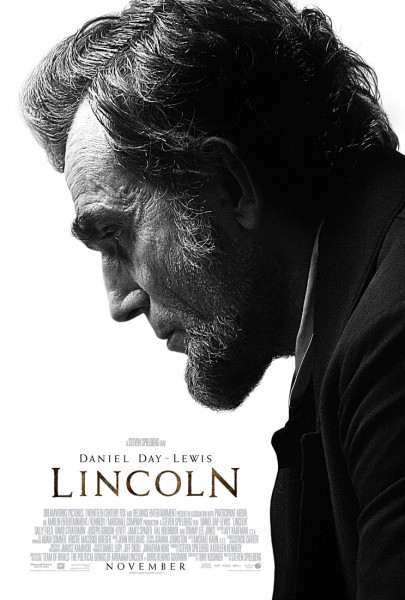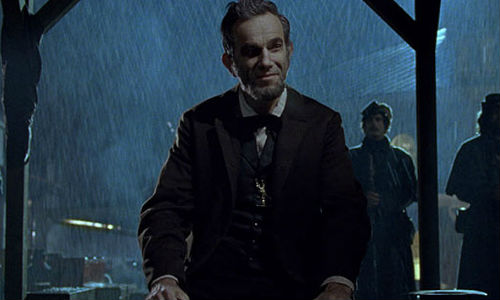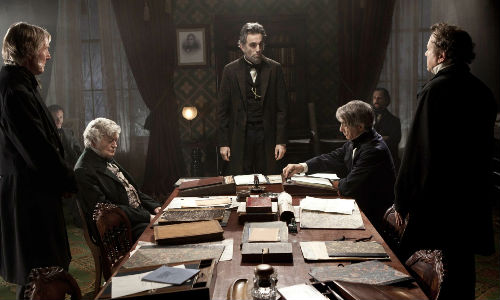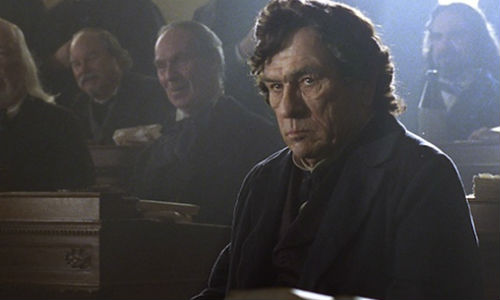
Rarely does a movie transport you so completely to another place and time, and into the lives of the people who called that era home, such that you feel as if its evocation is more real than the time you inhabit, but Lincoln, directed by Steven Spielberg from a screenplay by Tony Kushner, pulls off this masterful trick within minutes of its commencement.
It does it, not simply through the superb, and clearly Oscar-nomination worthy acting of Daniel Day-Lewis who brings the 16th President of the United States to life in vivid detail, and a cast who match him word for word in bringing such an important epoch into being once more (Sally Fields as Mary Todd Lincoln and Tommy Lee Jones are standouts in this regard), but through a willingness to portray this pivotal point in American history warts and all.
This is no slavish hagiography with Lincoln as the patron saint of all virtue and America as a towering colossus of unblemished democracy I (which I imagine is what many people might have been expecting).
Rather it captures beautifully what Tommy Lee Jones as Radical Republican Congressional leader Thaddeus Stevens calls Lincoln’s “purity” of purpose at one point, while illustrating his willingness to get as down and dirty as needed to accomplish a higher goal.
In short, he is blessedly portrayed as a real man, virtuous of purpose, and as noble as they come, but well aware of the flawed nature of the political world of which he is the temporary apex, and willing to work within it.

Admittedly there are moments at the start of this film, where Lincoln meets some soldiers at a marshalling ground who are able to quote the Gettysburg address word for word, that I worried may veer into saccharine-soaked veneration, but the effect is rather one of quite reverence for the man rather than pedestal-placing, and you are left impressed with his humility, his intellect and his ability to genuinely relate to people who elected him.
It is this innate sensibility as a “man of the people” that sees him re-elected in 1864, in the midst of the bloody and seemingly never-ending Civil War, which eventually claimed 750,000 American men of fighting age, with a mandate to end slavery, which he had opposed at the start of his first term in 1861, and which he was well aware must become a legally enforceable amendment to the constitution of the United States before the end of the war.
And so Spielberg concerns himself solely with this pivotal period between Lincoln’s re-election in late 1864 and April 14, 1865 when he was assassinated by John Wilkes Booth (who was part of a conspiracy to revive the now-failed Confederate cause, the war having ended 5 days earlier on April 9) and in the process does much to reveal the nature of America’s iconic 16th President, the people he surrounded himself with, and the schisms running deeply through American society at the time.

It is a deeply tumultuous period with Lincoln simultaneously pursuing his agenda to have the 13th Amendment passed in the House of Representatives, with all the messy back room dealing, and realpolitik this involved, while entertaining overtures from an exhausted and bankrupt Confederacy who were suing for peace and eager to settle as quickly as possible with as little loss to their way of life as possible.
But Lincoln is adamant that if he ends the war too soon that the impetus to end slavery will be lost as many people who will support the measure are only doing so out of political and military necessity and not out of any desire to see “this great evil” as it is described in the film by abolitionists, ended.
He is painfully aware that the War’s extension will cost countless thousands of lives as a final climactic battle to re-take the port of Wilmington, the South’s last access to the sea rages throughout January and February 1865, but he cannot take the chance that the South will re-admitted back into the Union with slavery not legally abolished.
And so begins a mammoth political battle between opposing camps in the President’s own Republican party – the aforementioned Radicals led by Thaddeus Stevens – and the Conservative wing headed by party founder Francis Preston Blair (Hal Holbrook), who is reluctantly sent on a peace mission to the South as part a condition of his support for Lincoln’s efforts to pass the 13th Amendment, and the Democrats who largely oppose ending slavery.

It is an engrossing down-to-the-wire battle that is leavened somewhat by the irreverent back room operatives, William N. Bilbo (James Spader) and Richard Schnell (Tim Blake Nelson) who are charged with sewing up deals on behalf of the President (though they are forbidden to mention him by name or claim any association with him) with lame duck Democrats (recently voted out and biding their time till they leave the House), and fiery oratory that is as much personal as it is political, and frequently amusing to boot.
But Lincoln also had battles to fight closer to home with eldest son Robert (Joseph Gordon-Levitt) returning from college in Boston demanding to be allowed to enlist, wife Mary still alternating between bitterness and grief and recriminating self-hatred (fuelled by the death of middle son Willy four years before), and youngest son Tad (Gulliver McGrath) gleefully racing into meetings at all hours and endlessly enquiring about all manner of things (which included a fascination with photos of slaves).
To say the man had his hands full would be a gross understatement.

But as portrayed by Daniel Day-Lewis, he remains calm and focused throughout battles both political and familial, only unleashing his feelings when it is deemed absolutely necessary such as when facing down opposing forces in his Cabinet or in a rare argument with his beloved but feisty wife Mary.
It is a masterful performance, and by all accounts, mirrors almost exactly the demeanour of the man himself.
His stellar performance, and that of his fellow cast mates, owes its gravitas in no small part to a superlative screenplay by Kushner who gifts each person with powerful, almost poetic words, eloquently spoken and with a cadence and rhythm that is as entrancing as it is impactful.
Coupled with an understated but heartfelt score by the legendary John Williams, Lincoln is, much like the man himself, one for the ages.